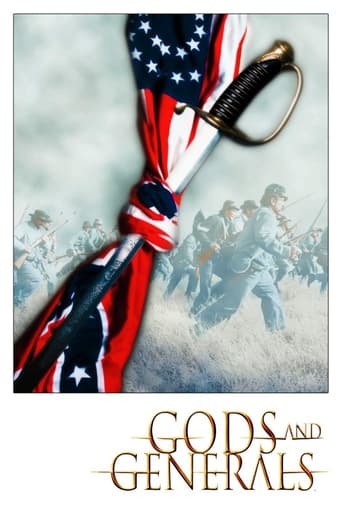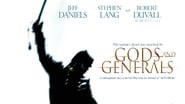aramis-112-804880
The surprising success of "Gettysburg" (based on the novel THE KILLER ANGELS) inspired the filmmakers to try to make an even-handed earlier story of the war leading up to that great battle, focusing mainly on the stories of Thomas "Stonewall" Jackson (Stephen Lang) in gray and Jeff Daniels (reprising his role as Gettysburg hero Joshua Chamberlain) in blue.In some ways, "Gods and Generals" is an improvement over "Gettysburg." Martin Sheen's Robert E. Lee (no doubt the worst performance by a notable actor since Jason Robards' Brutus in "Julius Caesar" in 1970) has been thankfully replaced by the much better Robert Duvall (is there some way to digitize Duvall into "Gettysburg"?) Several good actors have joined the "Gettysburg" bunch, including England's always good John Castle (as a southern who grew up in rural areas where accents were still prevalent, I always thought Brits did southern accents better than Americans from other parts of the US, with the one exception of Michael Caine in "Hurry Sundown").On the other hand, "Gettysburg" had a good focus, retelling the battle of Gettysburg--well, as they thought of it when the novel was written, though recent research made those theories obsolete even while they were being filmed; so much for research)."Gods and Generals" is too diffuse. It tries to shove too much into one movie. It should have been a miniseries, an earlier "Game of Thrones" type of entertainment, without the gratuitous nudity. Instead, they shove into the length of one (very) long movie every battle in the eastern theater of battle, up to the (spoiler to anyone who slept through American history) death of Jackson. Though in the interest of suspense I won't say who killed him.Unlike with "Gettysburg" I did not see this movie in the theaters, only on disk where they added material to make it even more interminable.Beautifully shot--perhaps too beautifully. But up to Gettysburg that part of the war was all fought in the south, and the south is quite lovely and photogenic.I don't know how accurate the details were. I had a hard time staying awake.
grantss
Not nearly as good as Gettysburg, or the book on which it is based.I watched Gods and Generals thinking it was going to be similar to Gettysburg: historically accurate, full of realistic battle scenes, and a wide and even spread of characters from both sides, with characters deep enough to understand their motivations, and the motivations of either side in the Civil War. With the same producers, director and many of the same actors, Gods and Generals promised to be similar. While the movie was historically accurate and the battle scenes quite realistic (though not to the point of Saving Private Ryan, say, ie it avoiding being gory), the characters were not evenly spread, mainly concentrating on Southern generals, and in particular Stonewall Jackson. The movie seemed more like a Stonewall Jackson biography than a recounting of the first 2 years of the war, up to Chancellorsville, which it pertains to be. Yet, if it is a movie about Stonewall Jackson, why not include Jackson's Shenandoah campaign, surely, after Chancellorsville, his greatest contribution to the Southern cause?The other problem I had with concentrating on Jackson was that Stephen Lang was probably not the best choice of actor for the role of Jackson. His acting seemed wooden and forced, like many of the actors in the movie, and I could not stop myself from thinking of him as Major General George Pickett, the character he played in Gettysburg. Pickett was a very different character to Jackson, and to think of Jackson as Pickett does Jackson no favours. Clearly the producers wanted to retain as many of the Gettysburg cast as possible, an admirable idea when they are playing the same characters as before (eg Jeff Daniels as Joshua Lawrence Chamberlain, the same actors for Gen Hancock and the 20th Maine sergeant), as one recognises them immediately and can fathom how their characters fit in the time-line of the war. Yet having Stephen Lang play Pickett in Gettysburg and Jackson in Gods and Generals makes no sense, for the reasons outlined above. Maybe they wanted to reward him for his role in Gettysburg, and he couldn't play Pickett here, as Pickett was not a significant figure in this part of the war.Another miscasting was Jason London as Jackson's adjutant, Captain Pendleton. He was not believable as a military character, especially one in authority.As Jackson was the central figure, there seemed not enough time, or inclination, to develop the other characters involved. Jeff Daniels probably has the 2nd most screen-time and does a good job of showing us Chamberlain's motivations and philosophies. Nobody else really appears for long enough for us to get a handle on what they are about. I thought Robert E Lee would be explored significantly, as he was a more important figure than Jackson or Chamberlain, especially in the context of the entire war, and especially as a he was played by a major actor, Robert Duvall, but we just scratch the surface of his character. Robert Duvall did an excellent job in the role, though.The most irritating aspect of the entire film is the amount of grandiose speeches. Hardly a scene goes by without someone waxing lyrical about what the war is all about, and means to them, all with accompanying stirring music. It all becomes so predictable after a while - the movie starts starts to resemble a musical, with every scene geared towards leading into a speech/song. While each sides motivations for fighting the war need to be explored, there are more subtle and less pretentious ways of going about it.The producers clearly wanted to fit in as many of the famous quotes of the period too, sometimes they seem to appear in dialogue for no rhyme or reason, and, like the speeches, whole scenes are geared toward just being a platform for the quote.This all said, there is a lot of good to be said about the movie too. As mentioned, it was historically very accurate and it does stay pretty much on track as regards the flow of events, only wandering off for the inevitable speech-scenes. The battle scenes are very well re-enacted and do give you a good insight into the battles of First Manassas/Bull Run, Fredericksburg and Chancellorsville. Fredericksburg was especially good, as one got to really experience how futile, pointless and courageous the Union attack was, and see how the topography of the area played a major role. The confrontation between the two Irish brigades was an especially emotional moment.The book by Jeff Shaara was far better. It covered a wide spread of characters, and didn't get bogged down in sentimentality and speeches, unlike the movie.Overall, a reasonable attempt, but it could have been a lot better. By spending less time on speeches and more time on the battles (maybe adding Jackson's Shenandoah campaign, to show where he really made a name for himself, and Antietam, the ultimate demonstration of callous death and destruction) and the major characters involved, and getting the right actors for the parts, the producers would have had a great movie on their hands.
chaos-rampant
This prequel of sorts to Gettysburg has all the flaws of that film and none of its charm. Endless speechifying, rousing muzak, platitudes and more platitudes, but at least Gettysburg had a certain intelligibility inherited from the western. This is clustered, badly edited, haphazardly filmed with no flair at all. The 'Hail Caesar' speech as Union soldiers are about to be thrown to their certain Fredericksburg death is one of the most cringe-worthy moments in any film ever.As to whether or not it is pro-Southern. People truly were as religious as the film shows, especially during the war. Southernerns had truly constructed a Cause, and believed in it, that allowed the issue of slavery to remain elusive; they were fighting for the affront of invasion and the right to not be told what to do. A small minority were slaveowners after all. Blacks did assist the Confederacy in various ways. And there was a notion that the war was waged on behalf of corporate and bank interests against Southern economy.But the film presses on these things in a sentimental way, with sad violin music subtly playing underneath the speeches, with the black maid at Fredericksburg defiantly defending her white owner's home against looting Union soldiers. We don't see the more vitriolic, more bellicose side of the Confederate argument.Duvall is a more fitting Lee than Sheen, but he plays him without any interest. Sheen channeled more than a little Apocalypse Now when he brought a fatalistic, half-mad glint in Lee's eyes.
krzysiektom
I give it 2 stars, the extra 1 star being basically for the effort. Such a disappointment. The fault lies with the script and the wrong mind frame of the producers and writers, who wanted to present the idealization of the South that never was. It is a boring, talky, pompous, posturing, false and unfair film. Maybe the dialogue looked good on paper, but not in the film - with very few exceptions. It presents the South as some mythical, unreal and never existing fairy tale of gentlemen, ladies, piano concerts and content black servants who are part of one happy family with the white folks. In fact the only two notable black roles are: a black fellow who enlists to FIGHT FOR THE CONFEDERATES(!) and a black governess who treats her white owners as family and their house as hers. Rather unfair on all the slaves who suffered and perished in the southern states prior to the war. And what's with the incessant religious overtones and Bible citing? All this did for me was show how misled and unintelligent these "Christian" people in fact were and how the Bible encouraged war and slavery. The only good and memorable part consists of 5 minutes, when the general played by Jeff Daniels talks with his colleague about the reasons for this war and then explains why the abolition of slavery was worth even dying for. But 5 out of 220 minutes is far too little of the good thing...




